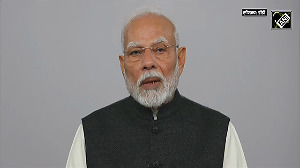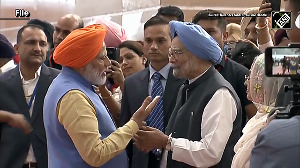 The government decision to cap sales by cash-and-carry players to their group front-end companies at 25 per cent of overall sales can force these wholesalers to reduce their investment plans by around Rs 800 crore (Rs 8 billion) in the immediate term, consultancy firm KPMG said.
The government decision to cap sales by cash-and-carry players to their group front-end companies at 25 per cent of overall sales can force these wholesalers to reduce their investment plans by around Rs 800 crore (Rs 8 billion) in the immediate term, consultancy firm KPMG said.
Global majors like Wal-Mart, Metro and Tesco started their cash-and-carry (wholesale) business in the country as existing rules do not permit foreign direct investment in multi-brand retail.
"The Indian market is too big to ignore completely but expansion plans will need to be carefully reassessed by the existing players. The immediate result will be a slowing down of their expansion plans by about Rs 600-800 crore, but the long-term impact will be much higher," KPMG Advisory Services manager Anand Ramanathan said.
The Department of Industrial Policy and Promotion (DIPP), while issuing a single document on FDI rules on April 1, had put a cap of 25 per cent on sale of the cash-and-carry players to the front-end retail companies owned by their Indian joint venture partners.
"Wholesale trade of goods would be permitted among companies of the same group. However, such wholesale trade to group companies taken together should not exceed 25 per cent of the total turnover of the wholesale venture and the wholesale made to the group companies should be for their internal use only," the DIPP rule said.
Ramanathan said the new rule would force the foreign players to redefine their thrust areas for this market. "They will now have to focus on maximising direct sales to their business-to-business customers, including unorganised players such as kirana stores and to organised players such as the Horeca segment," he said.
Horeca refers to the hotels, restaurants and catering segment of the food service business. KPMG said for international players the cash-and-carry route is the only option of entering the domestic market and then utilise their operations to supply to other formats within the market.
Ramanathan said the stringent norms would affect investment in the food and groceries segment the most by the multinational players.
Incidentally, the food and groceries segment is the one where penetration of the unorganised sector is the heaviest. Over the last week, there was speculation that players like Metro AG and Bharti-Walmart may curtail their wholesale business plans, while others like Carrefour, which are looking to start India operations soon, may go for a review.
However, none of them responded to queries sent in this regard.








 © 2024 Rediff.com -
© 2024 Rediff.com -